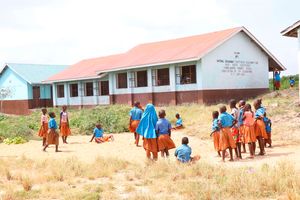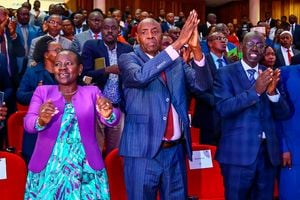
Murang’a High School Principal Willy Kuria celebrates after being elected Kenya Secondary Schools Heads Association chairman at Sheikh Khalifa Bin Zayed Hall in Mombasa on June 24, 2024.
Principals say they will be forced to increase school fees starting next term after the government reduced capitation per learner.
This is a big blow to parents whose children are returning to school starting Monday, July 1, 2024 from the one-week half-term break.
Principals will be forced to find alternatives to keep the schools going after the government said it will not be able to disburse the Sh22,244 capitation per year per learner but instead stick to Sh17,000.
“Principals will have to contend with the Sh17,000 capitation we have been disbursing. It will not be possible to disburse Sh20,000 capitation per year per learner,” said Education Cabinet Secretary Mr Ezekiel Machogu.
Speaking to Nation, the CS further pledged to ensure the capitation is disbursed on time.
The principals had proposed the fees to be increased from Sh53,000 to Sh69,000 for National School due to inflation and the high cost of living schools are grappling with.
Last week, the Kenya Secondary Schools Heads Association converged at Sheikh Zayed Hall, in Mombasa county to deliberate on critical issues affecting the sector including late disbursement of capitation.
Kessha National Chairman, Mr Willy Kuria told Nation that the conference was crucial for the stakeholders to take stock of the successes, challenges and solutions.
Mr Kuria said Sh53,000 in school fees is not enough to run national schools.
Raise school fees
“There was a time we had asked the state to raise school fees, but by then we wanted it to be raised to Sh69,000. The Ministry has our fee increment document proposal. The whole concept of school fees and capitation should be relooked at,” said the Kessha National Chairman.
While schools are supposed to receive a capitation of Sh22,244 a learner per annum, this year, they have received half.
“Out of the Sh22,244 capitation a student is supposed to receive, the state has so far disbursed Sh12,000 slightly 60 per cent. That money is inadequate to run schools for a year. That is why we are insisting we need to come up with a new funding programme for secondary schools,” said Mr Kuria.
Mr Kuria said the institutions have been grappling with capitation challenges.
Mr Kuria said this is the best time for Kenyans to rethink on how to refinance education.
“Capitation is a key issue. The money that is being disbursed from the Treasury is Sh17,000 instead of Sh22, 244. Then you are asked to set aside Sh5000 for infrastructure development and you are left with Sh12,000 some Sh2600 is taken for centralized procurement of books and activities, leaving schools with around Sh10,400 for tuition and operation,” said Mr Kuria.
Mr Kuria said when the Free Day Secondary Education program was initiated in 2008, schools were getting a capitation of Sh10,260.
“This means that what was available in 2008 is still what we are getting despite the inflation. The ministry retains funds for EduAfya and textbooks. Has the time come to bring parents on board and ask them to pay for school fees?” said Mr Kuria.
Kenya Union of Post-Primary Education Teachers (Kuppet), acting secretary general Moses Nthurima said disbursement of capitation funds is a key challenge in secondary schools.
“Kuppet is aware that, as I speak here, schools have a deficit of Sh3,000 for the first term. Nothing so far has been remitted for Term Two which will soon come to a close,” Mr Nthurima told Nation.
He condemned the Ministry of Education for retaining activity funds.
Develop talents
“This has thrown the management of co-curricular programmes into disarray. How are schools going to identify and develop talents when they can’t even take students for competitions?” he wondered.
He said he has attended national co-curricular events where the number of Ministry officials outranked that of teachers.
“These officials do not train players. They do not officiate at marches nor do they manage teams. Their only interest in the events is financial gain, which unfortunately comes at the expense of nurturing and developing talents,” added the Kuppet boss.
He challenged CS Machogu and his PS, Dr Belio Kipsang’, to revert the funds to the principals so that our teachers can be facilitated to manage co-curricular programmes.
The National Parents Association chairman Mr Silas Obuhatsa blamed the state for the predicament saying schools are bankrupt.
“Principals are in a dilemma. But how do principals run these institutions without funds?” he wondered.
The association urged parents to pay school fees on time adding that schools have a huge pending bill arising from non-payment of school fees.
On Wednesday last week, the government urged principals to live within their means with the capitation sent to schools due to financial constraints besieging the state.
Deputy President Rigathi Gachagua said the state is grappling with financial challenges due to huge wage bills and public debt.
“We have had challenges with escalating public debt and wage bills. We collect Sh2.2 trillion, yearly which goes into paying the public debt and wages. We are left with no alternative but to borrow for our developments after we give a share of revenue to counties,” said the DP.
Mr Gachagua said the delays in disbursement of capitation is beyond anything the government can do. He assured the principals that the state is streamlining systems for the timely release of funds.
“I ask for your indulgence. We will ensure capitation is released on time. But we call for prudent management of resources,” said the DP.
He further urged the principals to come up with income-generating projects including farming. Those with land, the DP urged them to come up with income-generating projects like rearing dairy cattle and starting bakeries.









